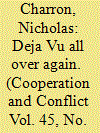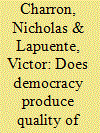|
|
|
Sort Order |
|
|
|
Items / Page
|
|
|
|
|
|
|
| Srl | Item |
| 1 |
ID:
096120


|
|
|
|
|
| Publication |
2010.
|
| Summary/Abstract |
Many in the media have depicted conflicts between the Western and Muslim worlds as a 'Clash of Civilizations' (CoC), and this has revived many of the questions surrounding the value of Samuel Huntington's CoC theory. Previous empirical tests have analysed his theory using low-level conflict at the interstate level or violent conflict at the subnational level. The former have demonstrated little or no empirical support for his theory, while the results in the latter group are mixed. This analysis adds to previous empirical studies in a number of ways. One, the empirical models test CoC exclusively in the post-Cold War era. Two, along with examining the civilizational determinants of military interstate disputes, as prior studies have done, I include models that focus exclusively on interstate wars, because Huntington frequently points out that a CoC between states will lead to violent political conflict. Finally, this study directly tests Huntington's civilizational 'fault lines' and Islamic 'bloody border' hypotheses. I include an extension and find that intra-civilizational conflict is relatively rare in the post-Cold War era. Contrary to earlier analyses, the data show strong empirical support for CoC, particularly when focusing on violent international conflict in the post-Cold War era, and the results are robust when testing the hypotheses with alternative data on international crises.
|
|
|
|
|
|
|
|
|
|
|
|
|
|
|
|
| 2 |
ID:
123626


|
|
|
|
|
| Publication |
2013.
|
| Summary/Abstract |
Does perceived corruption in recipient countries reduce support for foreign aid in donor countries? This under-explored yet salient question is examined using the 2009 Eurobarometer survey for the 27 EU countries. We suggest that perceived corruption can cause aid fatigue but that this relationship is highly contextualized. The results show that perceptions about corruption in developing countries reduce overall support for aid among respondents in donor countries. However, this effect is mitigated by country and contextual-level effects and different understandings of what we call the "aid-corruption paradox," namely that the need for foreign aid is often the greatest in corrupt environments. Three different dynamics of the aid-corruption paradox influence support for aid: moral, pragmatic, and strategic understandings. In EU-15 countries, the effect of perceived corruption in recipient states on aid fatigue can be substantially altered if aid is motivated by moral reasons for helping poor countries or if the purpose of aid is understood to improve governance. In new member states (NMS-12), the effect is reduced if respondents believe that the result of aid can serve national interests. The results provide new insights into the public opinion/development policy nexus, which suggest a number of salient policy recommendations and future areas for research.
|
|
|
|
|
|
|
|
|
|
|
|
|
|
|
|
| 3 |
ID:
094984


|
|
|
|
|
| Publication |
2010.
|
| Summary/Abstract |
This article analyses the effects of political regimes over state capacity or the quality of government (QoG): Do democratic states perform better than authoritarian ones? Previous studies point to a nonlinear relationship between democracy and government quality. It is argued here that QoG is a function of both forces of supply (leaders who have the power to make reforms) and demand (citizens' desire for mid- to long-term investments over short-term needs), the latter of which is a function of economic development. In democratic states, leaders have stronger incentives to improve QoG after a certain degree of wealth is reached, while in poorer countries they have little incentive for long-term bureaucratic investments. Thus it is predicted that the relationship between democracy and QoG is conditional, based on economic development. With over 125 countries in the sample, this hypothesis is tested using time-series panel data and spatial models, and strong empirical support is found.
|
|
|
|
|
|
|
|
|
|
|
|
|
|
|
|
|
|
|
|
|